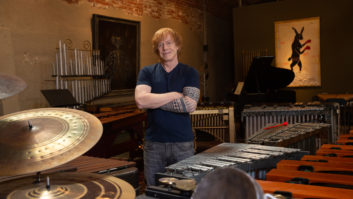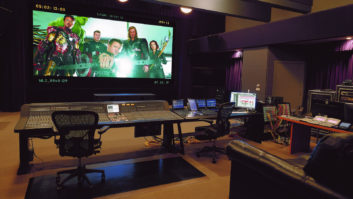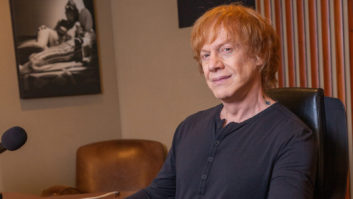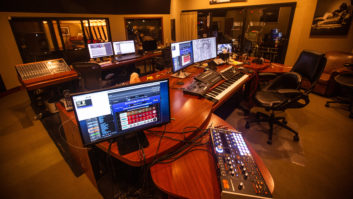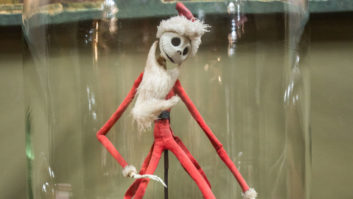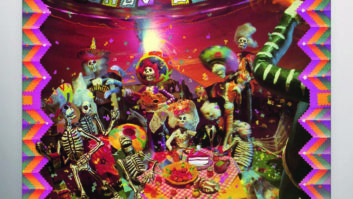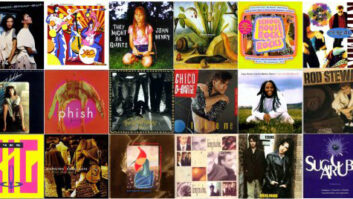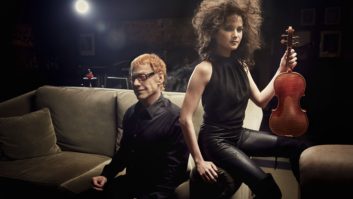When Danny Elfman’s name first appeared on major film scoring credits, those who recognized him most likely thought of him as the frontman for the new wave band Oingo Boingo, who scored modern rock hits in the ’80s with “Only a Lad,” “Dead Man’s Party” and “Weird Science,” among others. However, Oingo Boingo was not your run-of-the-mill pop band, and their eclectic arrangements and irreverant songs earned them a devoted following over the course of almost 15 years and 10 albums. Today, anyone aware of Elfman’s history realizes that his step from pop music to a successful film-scoring career was a perfectly natural move.
Before Oingo Boingo, Elfman spent a number of years working as a “music director” for his brother Richard’s theatrical troupe, The Mystic Knights of the Oingo Boingo. It was during that period that Elfman immersed himself in the music of Harry Partch and Terry Riley, as well as pioneering jazz artists like Cab Calloway and Duke Ellington. He also taught himself to transcribe music and create arrangements. This musical development, coupled with Elfman’s love of old monster movies, ’50s and ’60s sci-fi and fantastical films (like Ray Harryhausen’s Jason and the Argonauts) helped pave the way to his recording work, and then to projects with Burton, Sam Raimi and Gus Van Zandt, among others.
Elfman’s first foray into film scoring was in 1980 for his brother’s film Forbidden Zone. His first major studio film, however, was Tim Burton’s Pee-Wee’s Big Adventure. That marked the beginning of a long, productive relationship; Elfman has worked on every one of Burton’s films since, with the exception of Ed Wood.
In all, Elfman has scored music for 45 films, including Men In Black, A Simple Plan, Good Will Hunting, The Family Man, Proof of Life, Beetle-juice, Edward Scissorhands, Batman, Batman Returns, The Nightmare Before Christmas, Midnight Run, Scrooged, A Civil Action and The Legend of Sleepy Hollow. It would be tough to label Elfman’s style — words like quirky, playful and whimsical come to mind, but they don’t do him justice. Quirky or not, Elfman is not afraid to experiment, and he creates empathetic nuances and surprises that are unique to each score.
I understand that you are getting ready to work on Tim Burton’s version of Planet of the Apes.
I haven’t started yet, but I took my daughter today to the set and had her pose with a few of the apes. [Laughs.] My daughter had a great time. She is 16 and has known Tim Burton her whole life. She was born the same year I did Pee Wee’s Big Adventure. She tortures him still by constantly calling him Uncle Tim. He goes [makes an exasperated sound]. She does that because she knows it annoys him. [Laughs.] The only anecdote I have so far is seeing the trailer in a packed theater full of rowdy half- and fully clothed apes all hollering and clapping. They screened it for the cast. It was a moment.
Let’s talk about scoring music for film.
Why talk to me, for God’s sake? [Laughs.] I’m thinking about getting into it some day.
You ought to give it a try.
I should give it a try. It seems like these days, just about anyone can do it, so why not? Huh?
Just get your sampler and some Pro Tools and slam it together.
Yeah. Slam it together.
To your credit, your music doesn’t sound that way in the films you’ve scored. You do a great job of blending rich-sounding symphonic and choral elements with more interesting percussive and synthesized components. Give me an idea of how your process evolves.
Oh, boy. Organized chaos. I’m not a naturally methodical person, but I have to force myself to create a bit of a methodical way of thinking at the beginning of the process, and then it becomes chaos. It’s really both. There is a methodical approach that I take at first. I can’t start writing the score until I have all of my themes completely laid out. I have to know what they are and how they are going work and how they interrelate. I always think about it like doing a painting, and I can’t start the painting until all of my colors are completely worked out.
A painter friend of mine in New York once brought me to his studio, and he was setting up all of these jars of pigments and colors. I asked him what he was doing, and he said, “I’ve been doing this for about a month, and I’m about to start some paintings, and I don’t start until I’ve settled on exactly what tones and pigment and colors are compared and laid out in a certain fashion. When it is completely done, I’ll start my first picture.” I thought to myself, “That is exactly what I’m doing when I start a film.” I’m laying out all the melodic pieces, knowing in my head how it is all going to work together.
Once I have all of those elements together, there is no method anymore. I just dive into the first cue. I go as close to chronologically as I possibly can. I don’t plan or think about where the music is going to go. It really is extremely unmethodical. I tend to let the music carry itself, and I become very often surprised by it. I never question it. The beauty of working with Tim is neither does he.
For example, on Sleepy Hollow, I wrote this dark theme for the Horseman and I wrote a kind of a child’s theme for Ichabod Crane, which in fact would play when he was a child, on flashbacks. For reasons that I don’t understand and never questioned, that theme kept coming in the middle of the Horseman’s theme. This bit of innocence would just happen, and I remember thinking, “What is this doing here?” What I’ve learned over the years is to never ask that question. You just enjoy it, use it and move on. Everything musically…if it appears in a cue in a certain way, it is there for a reason. The less I try to analyze it, the better I am. So, that innocent theme juxtaposed against that monster just worked for me.
See, a lot of directors wouldn’t let you do that. They would think very methodically and intellectually about music and say, “Oh my God! How can you play this theme over that character?” Well, what Bernard Hermann taught me is that basically it was all bullshit. You can do any goddamn thing you want. [Laughs.] The only rule is that there are no rules. Whatever works! Period!
So you basically trust the mystical process of the art.
Absolutely. My trick is really simple. I prepare as much as possible in the beginning, and then I let it take over. If I don’t do the preparation in the beginning, it is likely to not be cohesive in the end, and that isn’t acceptable. Ultimately, it has to fit together like a puzzle. It is like, “Do the homework in the beginning and then don’t ever think about it again.”
I love the fact that Tim never questions that stuff and goes, “What in the hell are you doing playing Ichabod’s theme over the Horseman?” He reacts to it the same way I do. He’ll chuckle. He thinks only about the music on a totally visceral level. He doesn’t intellectualize it, and that is how I write it.
Speaking of visceral, I really enjoyed the classic horror movie vibe of Sleepy Hollow.
It was fun. There is this one scene in that movie that I thought was so great for Tim, and it was the first thing that he showed me. It was the scene where the family is putting the little boy to bed and the Horseman breaks in. First, the Horseman decapitates the father, and then the mother gets it. The little boy is hiding under the floor when his mother gets it, and he sees his mother’s head rolling on the floor and [the Horseman] ends up looking down through the cracks at the boy. Up to that point, Tim never had gotten like that. His violence has never been that intense. The level of violence in Tim’s movies is like that of a Western; he is so not into graphic violence. But this was such a visceral scene, and the Horseman does, in fact, catch the kid and get him, too.
We grew up on a lot of the same kinds of fantasy and monster movies, and that is why I think we share similar sensibilities. Sleepy Hollow was very much like a good version of those kinds of films. I grew up a block from a movie theater, and that was like the center of my existence. I went there every weekend, with the exception of weekends when they would have what I would’ve called “kids’ movies,” which I hated as a kid. When I say that, I mean films with no monsters or mutants or fantasy.
I lived a block from a movie theater, but they ran The Sound of Music for five years.
Oh my God! That would’ve been the death of me! As a kid, I wouldn’t see musicals if you paid me. I hated musicals, and I hated comedies, for the most part. I feel so fortunate to have lived so near a theater that catered to the tastes of kids at that time, which were monster movies and science fiction.
I loved the Ray Harryhausen stuff, which had Bernard Hermann’s music — movies like Jason and the Argonauts and The Seven Voyages of Sinbad and Mysterious Island. I also loved Roger Corman’s Edgar Allen Poe stuff, like The Raven and Tales of Terror and House of Usher. These were my ideas of a comedy. It wasn’t Flubber or Chitty Chitty Bang Bang or that kind of stuff, which I really detested. My idols were Peter Lorre, Boris Karloff and Vincent Price.
One of my very favorite movies growing up was a movie called The Haunting, which would definitely stay up there on my permanent Top 10 list. It was so great. I didn’t realize at the time that this was the same Robert Weiss that did The Day the Earth Stood Still and West Side Story. [Laughs.] Talk about a bit of versatility?
The Day the Earth Stood Still is my favorite of those fantasy films. It is also where I discovered Bernard Hermann’s name, and it suddenly had meaning to me. I was so taken and moved by that film. It was the first time it dawned on me that the music was composed by an individual. As a kid, you just assume that everything is just “there.” That was the first time I realized that it wasn’t just “there,” and it isn’t all the same. This was great music, and it was moving me.
When did you start getting into music?
Most of my high school friends were musicians, and I wasn’t. I figured it was way too late for me, because everyone I knew had been playing since they were seven. At the time, it seemed like, “Forget it. It’s never going to happen.” I mean, I had a guitar and doodled on organ and piano. I tried to take some lessons, and I was really bad at lessons. I would memorize my lessons really quickly, but I couldn’t play stuff back to the teacher. I’m really bad at one-on-one. I’m much better in front of a thousand people, instead of one person.
Anyway, I never went to college, and I never even quite finished high school, actually. I went off to France before my last year in high school in 1971. My brother was in a crazy music theatrical troupe there called Le Grande Magic Circus. I was just 18, and I joined him in France. I had just picked up the violin that year and was planning on traveling around the world. I wanted a small instrument to try to learn while I was traveling. Guitar was just too big. I ended up getting hired and touring with them, and I spent close to a year traveling throughout Africa, primarily through West Africa. I remember I spent my 19th birthday in Africa, because the Nigerian border guards sang me “Happy Birthday.” I lived for a brief while in the Canary Islands.
My brother returned to Los Angeles and started a theater troupe inspired by Le Grande Magic Circus called the Mystic Knights of the Oingo Boingo. He recruited me to become the “music director” of the Mystic Knights the day after I arrived home with hepatitis. It was like, “You don’t have to work hard. Just soak it in and watch while you are getting your health back.” [Laughs.]
There were eight years of really intensive work with the Mystic Knights. In that period, it went from being like a ragtag street group to being a really full-blown theatrical troupe, where everyone had to play three instruments. I picked up trombone. I taught myself to write and transcribe. I started really getting into percussion.
A lot of the driving force of the Mystic Knights were these two percussion ensembles and early jazz. I refused to listen to contemporary music for almost 10 years. I wouldn’t listen to anything after 1935.
Leon Schneiderman, who was the saxophone player and a high school friend, went with me to Africa, and we brought back these balafons, but they were too delicate, so we built our own. We built bass balafons. Then we started building a pot-and-pan orchestra, with big racks of tuned mining pans and beer cans and measuring cups.
There was a large portion of my life where I really wanted to become a modern-age Harry Partch, who was kind of my idol. Harry Partch was a very eccentric American composer from the ’40s and ’50s who built his own instruments. He developed some scales and used microtonal tuning and devised ways to write for these microtonal marimbas and instruments that he built. I loved that and was fascinated by the music of Terry Riley. I really loved percussion.
The Mystic Knights was this odd theatrical union of crazy percussion ensembles and the music that I loved most during the ’70s, which was a lot of vintage Cab Calloway, Duke Ellington and Django Reinhardt. It was through that early jazz that I taught myself to write and notate, because I used to have to transcribe the solos and the arrangements.
So you are utterly self-taught?
Yes. I owe a great debt to Duke Ellington, really. Those were the first transcriptions I did. His arrangements were not that simple, and the harmonies were really interesting. I learned that, if I took the time, I could get it exactly right. That is where I learned my confidence in my ear.
Cab Calloway’s arrangements were also really a big deal to me. Some of those arrangements had some really dense, crazy shit, and they were not that easy to write. They could be very fast and complicated. I would listen to videocassettes of Betty Boop cartoons and old records, but I learned that if I listened hard, I could freeze it in my head and hold it there and write it down. It ended up being critical training for me, even though I didn’t know it at the time.
This was also where I began to compose. The last big and most ambitious composition for the Knights ended up being what really gave me the confidence many years later when I was asked to compose for film. It was the “Oingo Boingo Piano Concerto 1 and a Half.”
What caused you to move from the Mystic Knights into starting up a band?
It was really hearing the ska that came out of England around 1978. That is what turned me around. I loved listening to the High Life music of West Africa. It was a little more Latin than ska, but really up-tempo. It was the same exact-size band as Oingo Boingo became — an eight-piece band with a horn section. It was hearing The Specials, Selecter and Madness and then XTC, who really clicked for me. I wasn’t a fan of ’70s rock at all, but when I heard all this energetic stuff coming out of England, that is what totally did it for me. Bang!
So it wasn’t until the very end of the ’70s that you heard any popular music that you could relate to?
Yeah. Somewhere, early on in that decade, a trumpet player friend of mine turned me onto Miles Davis’ Bitches Brew and Sravinsky’s Rites of Spring, and it was probably six short months after that that I threw away almost my entire record collection. [Laughs.] I’ve always been prone to extremes. I don’t know what exactly clicked me into old jazz, but I felt that I was displaced in the ’70s. I felt I really belonged in the ’20s. I felt like I was a character out of late-1920s Paris that somehow got stuck in 1970s Los Angeles.
Was your family musical?
No. My parents listened to folk music like Pete Seeger. I know my Dad listened to Beethoven, I seem to recall. Classics. They were schoolteachers.
So how did they feel about you leaving high school?
They weren’t happy. I did get a diploma sent to me. I just didn’t want to stick around to get it. I managed to squeak enough credits and take off. It wasn’t like I wasn’t interested in college. I just wanted to get the find out of high school as fast as I could. I really disliked people my age, for the most part. I just had as much as I could take of teenage boys in general. It was that weird out-of-place thing. Being surrounded by teenage boys was, for me, like being in some kind of zoo full of orangutans. For the most part, they were so finding stupid and proud of it that it was mind-boggling. [Laughs.] It probably hasn’t changed that much. I just wanted to be around girls. I couldn’t stand boys. I had some friends who were boys, but they were misfits like myself. They were eccentrics.
I was very much in a similar situation in junior high and high school. I was the tall skinny guy who was given a hard time by all the jocks.
And I was the little weird-looking albino kid that couldn’t see anything in the sun. When they did team sports, I was blind as a mole in the light. Of course, in those days, you couldn’t wear sunglasses to school. I didn’t understand that I simply wasn’t designed to be out in daylight under any circumstances, much less catch a ball under a sunlit sky. I was a pretty bitter kid, a nerd, at that age.
Is there anything that I haven’t touched upon that you would like to address?
You didn’t ask me about a lot of equipment, which I really appreciate. I’m always grateful when it is not a super-technical talk of “what’s my gear.”
I will say that I’m constantly changing my rig, but the most common, long-lasting staples from the beginning that I have been using are the E-mu samplers, which I’ve been using since their very first E-I, the Macintosh, which I’ve used since the Jurassic version, and Mark of the Unicorn Performer, which I’ve used since its earliest incarnation. My extensive personal sample library of percussion is all laid out for the Emulators, but recently I began converting some of that library to use on the Gigastudio as well.
Concerning Mark of the Unicorn, that is one of those things that, once you are really good at a certain software, it would take a really compelling reason to change. The speakers I listen to are Questeds. I love listening to those. I have a pair of the small Genelecs, which are nice. If I have to set up in another space, I’ll use the Genelecs.
I have a bunch of stuff spread out in different places, but I never use more than two in one place. Actually, I have two G4s, eight Emulators and two Pro Tools systems, because everything is duplicated. When I go into the studio, I send an entire duplication of my setup in a mobile rig. That is because it was getting more ridiculous having to drag all of my shit down into the studio.
See, a lot of the samples and things that I use stay in the score. A lot, like the orchestra sounds, get replaced by the real thing. But very often, there are anywhere from a dozen to 48 tracks or more of my own stuff. My engineers are always moaning and groaning about this, because I lay down stuff that isn’t orchestral. It is stuff I’m playing, and I want to bring it in. Almost all of the percussion and synthesizers in my scores are mine. So, finally, I realized that the only way I could do this was to have a rig that I could roll in and plug in and set up and be up and running in a couple of hours — instead of dragging half of my studio down and taking an entire day setting it up and then dragging it back. It just didn’t make sense.
That said, the whole art is nontechnical. It has become technical, in terms of laying it out. I have to say that working out stuff with a director, in one’s home studio, before you get in front of an orchestra, is usually a very positive thing. Because whatever differences you have, you try to get through as many of them as possible without a big orchestra there, so you can duke it out on your own time, so to speak. I think that is good. It is good to know that the technical stuff doesn’t make the score. It helps with the presentation, and directors really want that nowadays, but I started out with just a piano and a couple of little sequencers and then grew into other things. It still hasn’t changed the fact that the art is still the art, and it is still about capturing the tone.
Your scoring for the film Edward Scissorhands was truly magical at capturing a tone. It is probably the most mimicked film piece that you have done to date.
That is clearly true. Closer to Christmas time each year, the Edward stuff just starts popping out all over the place. It is really funny. The phone really starts ringing as it gets close to that season. People will call up and say, “Did you hear so and so? You’ve got to check it out?” It also rings at some odd times, for different commercials.
It certainly is one of my favorite Tim Burton movies, and even though there was plenty of humor, I found it to be a wonderfully touching movie.
So did I, but then anything that is emotional in movies is because you “buy” it. I know a lot of people who thought Titanic was extremely emotional and that it moved them to tears. This was from people who had relatively good taste. [Laughs.] For me, I didn’t feel a single stir inside of me. Why we find anything moving or not is a pretty subjective thing.
It has been said that Burton’s movies always have this compassionate thread for the misfit underdog. Obviously, you relate to that, the kid who needed sunglasses and had a hell of a time trying to catch a football in school. It makes perfect sense that the two of you would enjoy such a positive collaboration.
That is definitely true. [Laughs.] Tim and I both were probably the underdogs in our past. Weird kids who struggled hard to find the niche.
Rick Clark is a Mix contributing editor.
